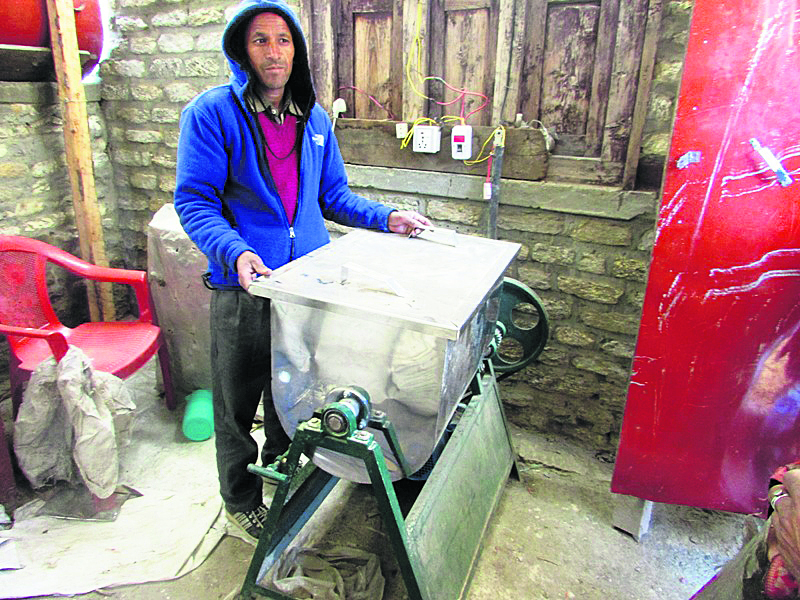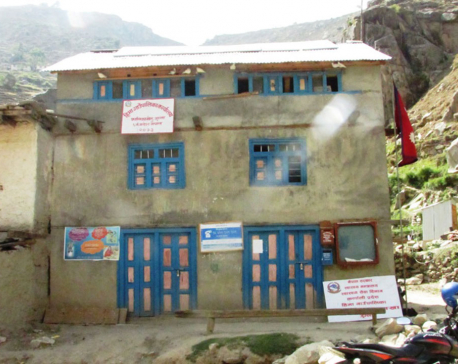
OR

JUMLA, Feb 22: Noodles remained hugely popular in Jumla for several years. So much so that many Jumlis believed that noodles soup was a great vitamin supplement. Locals preferred noodles and biscuits to grains and vegetables grown in their own fields. Thanks to the government-run nutrition awareness program started last year, things have changed for good in Jumla.
“Now noodles are being displaced by locally grown grains. People are now consuming flours of wheat, maize, beans etc, instead of noodles” said Batu Budha, a health worker from Rarahil, Jumla. “I have stopped giving noodles and other packaged food to my children. I’ve switched to organic food items,” she shared.
The mix of flours is called Sarbottam Pitho. Mothers like Batu feel that local grains have greatly improved their and their kids’ health.
“Earlier, I used to give them noodles and biscuits with the morning tea. It’s been around a year, I have stopped buying such things from the market. Now everyone in the family eats whatever we grow in our fields,” said Batu who has been raising health awareness in the area for a long time.
According to her, noodles were the first choice for the young and old alike. So much so that women would be given noodles soup post delivery, as that was considered highly nutritious. Some were even addicted to this and wanted to have nothing else when bed-ridden, she revealed. “But the nutrition classes completely changed our minds. We came to know that the packaged food is worse than our organic grains,” she remarked.
Batu’s family consumes at least 50 kg of Sarbotam Pitho in a month. Her three children and she herself and her husband take the mixture of flours in the breakfast. Even for the day and evening meals, the flour mix is used as fast food. “My family is becoming healthier. My children do not get sick these days,” she said.
Earlier, locals had to take their grains to a far away Ghatta (stone mill) for grinding. Of late, such services are available nearby. This was made possible with the joint efforts of the District Health Office and the Agriculture and Food Security Program.
“We used to think that maize, beans and wheat flours were meant for mules and other cattle. We did not know they are best for us as well. Our cattle had all the nutritious food earlier while we relied on rotten imported food,” said Batu, adding that people have now become smarter.
“Only when we have a left-over, we provide the grains or its flour to our mules and sheep now. Family is the first priority,” she stated.
The government provided a couple of grinding machines in Jumla to make the nutrition program a success. According to Pariral Rawal who has been operating one such machine, Sarbottam Pitho was targeted at children but remarkably, it has ‘gone viral and there is no age bar in terms of its consumption’. “People are now aware that organic grains are highly nutritious and even cheaper. So, they have started consuming them,” Rawal said.
Rawal stated that a grinding machine worth Rs 315,000 was fixed at Rarahil only a few months ago by the government. On an average, he receives demand for 50 kg of flour a day. “Multiply that with 30 days. People here are quite fond of Sorbottam Pitho. Now, our children are not going to be victims of malnutrition,” he said.
It costs Rs 5 for locals to get one kg of grain grinded. But the comfort is that the government has encouraged them to get it done through ‘Inclusive Saving and Credit Cooperative’. “Due to the affiliation with the cooperative, they don’t have to pay right away. The entire set-up is for boosting consumption of nutritious grains and improving the people’s health. And it is working pretty well here,” noted Rawal.
According to Rawal, some people buy the mixed flour packs also from the market. Those packages are supplied from Kathmandu and other places. However, the good thing is, locals like their own products now. “Two types of Sarbotam Pithos are being used. One, which you find in the market or at health institutions. It is neither as tasty nor nutritious as the local Sarbotam Pitho. And Jumlis have started understanding this,” he said.
You May Like This

Locals padlock RM's office in Jumla against financial irregularities
JUMLA, Aug 20: Citing financial irregularities on development activities, locals of Dhachugaun and Kudu village have padlocked the office of... Read More...

Locals of Jumla to vote for candidates who prioritize road connectivity
JUMLA, Nov 9: Candidates contesting the upcoming parliamentary and provincial elections have spearheaded their election campaigns to lure more number of... Read More...

Jumla locals question promise of free, quality health services
JUMLA, Nov 8: Palke Nepali, 45, an asthma patient was having difficulty to breathe on Sunday morning. Within an hour villagers... Read More...






Just In
- Challenges Confronting the New Coalition
- NRB introduces cautiously flexible measures to address ongoing slowdown in various economic sectors
- Forced Covid-19 cremations: is it too late for redemption?
- NRB to provide collateral-free loans to foreign employment seekers
- NEB to publish Grade 12 results next week
- Body handover begins; Relatives remain dissatisfied with insurance, compensation amount
- NC defers its plan to join Koshi govt
- NRB to review microfinance loan interest rate











Leave A Comment